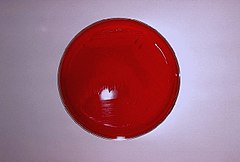 Zellkultur von Brucella suis
Zellkultur von Brucella suis
| Klassifikation nach ICD-10
|
| A23.2
|
Brucellose durch Brucella suis
|
|
|
{{{02-BEZEICHNUNG}}}
|
|
|
{{{03-BEZEICHNUNG}}}
|
|
|
{{{04-BEZEICHNUNG}}}
|
|
|
{{{05-BEZEICHNUNG}}}
|
|
|
{{{06-BEZEICHNUNG}}}
|
|
|
{{{07-BEZEICHNUNG}}}
|
|
|
{{{08-BEZEICHNUNG}}}
|
|
|
{{{09-BEZEICHNUNG}}}
|
|
|
{{{10-BEZEICHNUNG}}}
|
|
|
{{{11-BEZEICHNUNG}}}
|
|
|
{{{12-BEZEICHNUNG}}}
|
|
|
{{{13-BEZEICHNUNG}}}
|
|
|
{{{14-BEZEICHNUNG}}}
|
|
|
{{{15-BEZEICHNUNG}}}
|
|
|
{{{16-BEZEICHNUNG}}}
|
|
|
{{{17-BEZEICHNUNG}}}
|
|
|
{{{18-BEZEICHNUNG}}}
|
|
|
{{{19-BEZEICHNUNG}}}
|
|
|
{{{20-BEZEICHNUNG}}}
|
| Vorlage:Infobox ICD/Wartung
|
{{{21BEZEICHNUNG}}}
|
| ICD-10 online (WHO-Version 2019)
|
Die Schweinebrucellose ist eine Deckseuche von Schweinen, die vom Bakterium Brucella suis aus der Gattung Brucella verursacht wird. Auch für Brucella abortus (Rinderbrucellose) und Brucella melitensis (Schaf- und Ziegenbrucellose) ist das Schwein als Nebenwirt empfänglich, zeigt aber kaum klinische Symptome.

